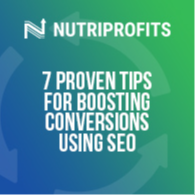Any affiliate marketer’s dream is to have as many visitors and commissions as possible via their affiliate website. However, affiliate marketing has some stiff competition, so it’s going to take a lot of effort and determination for a marketer to earn and keep consumers on their website.
The average individual stays on a website for 15 seconds or fewer. That means affiliate marketers have to make an impactful first impression for consumers to stay around longer.
Want to know what tips won’t keep consumers around for long? Then here are six reasons on why visitors leave an affiliate marketer’s website.
What is an Affiliate Website?
When someone first gets into affiliate marketing, they’re often getting a website that focuses on promoting an affiliate’s products. That website is known as an affiliate website.
Unlike people who sell on eBay and Amazon, affiliate marketers don’t need to own the products they’re trying to sell. All they need to do is promote someone else’s products via a link on said affiliate website. When someone clicks on that link and buys a product, the affiliate marketer earns a commission.
There are four types of popular affiliate websites:
- Cashback-Oriented Affiliate Website: It provides consumers with cashbacks they can use for getting some cash they spent back.
- Content-Based Affiliate Website: It’s a place focused on creating content for affiliate marketers to place their links to their websites.
- Coupon-Focused Affiliate Website: It promotes coupons or discounts from online stores with many fans and repeat consumers.
- Review-Focused Affiliate Website: It’s a place focused on an affiliate marketer’s real-life experience with an affiliate product.
Why Are Visitors Leaving Your Affiliate Website?
With the definition of an affiliate website in mind, it’s time to learn about what not to do so that their visitors don’t leave the website.
As stated before, the average individual stays on a website for 15 seconds or fewer. That means affiliate marketers must make an impactful first impression to earn and keep consumers.
Any affiliate marketer using these six examples listed below is guaranteed to lose visitors, consumers, and commissions.
Reason One: Too Many Ads
Suppose someone is trying to watch a YouTube video. However, they’re bombarded with ads while they’re trying to watch the video. So, they exit out in disgust. That’s how many visitors feel when an affiliate marketer seasons their affiliate website with too many ads.
Making money is the whole point of affiliate marketing, but bombarding an affiliate website with ads at the top and bottom, on the sides, and between texts will clutter the website. Thus, visitors will leave. Besides, most ad engines, like Google Adsense, degrade a website’s performance.
The same can be said for spamming the affiliate link. That affiliate link may be a primary way of earning money, but spamming it too often will turn consumers off. Instead, affiliate marketers should let the content speak for itself and integrate the ads naturally in said content.
Reason Two: Unappealing Website
Consumers love feeling welcomed when they visit a website that’s easy to navigate and is easy on the eyes. Take those two things away, and those consumers will end up leaving.
Some affiliate marketers may not think this is much of a problem because they’re so focused on SEO (search engine optimization), but the average consumer is not an affiliate marketer. They won’t know or care about SEO; they’re going to care about how the affiliate website looks and whether it’s easy to load and navigate.
While having an appealing-looking website may not score much SEO points, it’s enough to keep visitors. That’s why it’s vital for affiliate marketers to update their websites’ designs every once in a while. Not only does website design improve every day, but people’s tastes also change over the years.
For example, a website’s text should be easy to read. If the background colors and font choices make the text unreadable, visitors will leave.
Reason Three: Slow or Unresponsive Website
Improved technology is also why affiliate marketers should update their websites. Nothing’s more frustrating than a slow-loading or non-responsive website.
There’s a reason why Google considers website loading speed as a ranking signal. Websites that take longer than 5.6 seconds to load are shown to convert at a mere 0.6%. When speeds are improved to less than 2.4 seconds, conversion rates triple by as much as 1.9%.
It also helps affiliate marketers if their websites respond to both desktops and mobile devices, like most websites designed after 2014. Having a website that responds to only one or the other leaves out many consumers.
Part of that responsiveness also includes the ease of a website’s navigation. Navigation is supposed to be based on what consumers want, not based on what the affiliate marketer wants. Site navigation should have easy-to-understand language, clickable buttons, links leading to where they should lead, and drop-down sub-navigation cues.
Reason Four: Compromised Security
Everyone wants to feel secure when they visit a website, especially if they’re going to trust it with a potential purchase. When that security is compromised, though, that’ll lose a lot of consumers’ trust.
Affiliate marketers can start with the basics like Secure Sockets Layer (SSL) certificates. Lacking one of these can not only affect the affiliate marketer’s search ranking, but visitors will also notice these shortcomings right away.
The worst-case scenario is getting hacked. Getting hacked can send consumers potential warning notices, and affiliate marketers will lose consumers before the website’s even loaded.
That’s why affiliate marketers should always take strict security measures. For example, they can regularly scan for malware on their hosting plans. They can also have backups in case of an emergency.
Reason Five: Autoplaying Videos
Suppose someone is visiting a website, and a video automatically starts playing as soon as they visit said website. That person jumps in shock and exits out of the website immediately.
That’s how most people react when a video automatically starts playing on an affiliate website. There’s rarely anything that makes people exit out of a website faster than an autoplaying video.
In the case of video-sharing websites like YouTube, playing videos is the whole point of these websites, so visitors are expecting it. But for an affiliate website, an autoplaying video is more likely to scare a visitor and make them leave. This is especially the case when a video plays before the website completely loads.
Consumers would much rather control when they watch their videos. Affiliate marketers can add videos onto their websites, but the videos shouldn’t play automatically.
Reason Six: Lack of Trust
Trust is one of the most important things about affiliate marketing. If the affiliate marketer loses a consumer’s trust, then they’ll lose commissions and money, too. There are many ways an affiliate marketer can lose a consumer’s trust.
Affiliate marketers can deceive their consumers with their content and titles. Conducting an eye-catching title is crucial for gaining clicks and commissions, but the content should still apply to the title.
For example, suppose a consumer sees a catchy headline, like “Top 10 Ways to Keep Your Body in Tip-Top Shape.” They click on that link, but the content isn't about 10 ways to keep their body in tip-top shape. It’s about health risks that’ll negatively affect the body.
It’s an easy way to make customers feel tricked and deceived. As such, content creators and affiliate marketers should create content and titles that apply to what they’re talking about. It shouldn’t matter whether it’s long-form or short-form content; useful content can be clever, fun, and relevant to what it’s about.
Unfortunately, some affiliate marketers get too focused on getting a consumer’s attention rather than making relevant content.
Being unclear can also lose a consumer’s trust. Most affiliate marketers will talk about a product’s features, but talking about how said features can benefit the consumers will gain them lots of trust. Don’t be vague with the features; be specific about how it’ll affect the consumer.
Of course, affiliate marketers should always have an affiliate disclosure. Consumers should know how the affiliate marketer earns money from their affiliate website. Consumers finding the affiliate tag in the URL after they’ve clicked the link can destroy trust in a heartbeat, so be certain to disclose affiliate links or sponsorships.
Summary
Affiliate marketers yearn to earn many visitors and commissions via their affiliate website. However, when they use these six reasons listed above on their website, visitors will leave. By keeping these six things in mind, affiliate marketers can keep earning their commissions and keep a healthy consumer base that can keep visiting them for many purchases to come.





.jpg)

-1-1.jpg)